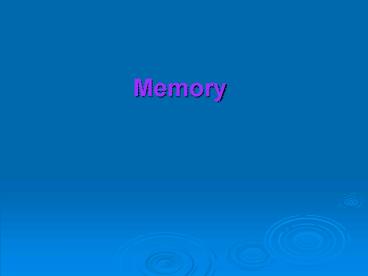Memory PowerPoint PPT Presentation
1 / 16
Title: Memory
1
- Memory
2
Memory
- Memory
- persistence of learning over time via the storage
and retrieval of information - Flashbulb Memory
- a clear memory of an emotionally significant
moment or event
3
Memory
- Encoding
- the processing of information into the memory
system - Storage
- the retention of encoded information over time
- Retrieval
- process of getting information out of memory
4
Memory
- Short-Term Memory
- activated memory that holds a few items briefly
- limited in duration and capacity
- magical number 7/-2
- Long-Term Memory
- the relatively permanent and limitless storehouse
of the memory system
5
Encoding
- Automatic Processing
- unconscious encoding of incidental information
- well-learned information
- Effortful Processing
- requires attention and conscious effort
- Rehearsal
- conscious repetition of information
- to maintain it in consciousness
- to encode it for storage
6
Encoding
- Ebbinghaus used nonsense syllables
- the more times practiced on Day 1, the fewer
repetitions to relearn on Day 2 - Spacing Effect
- distributed practice yields better long- term
retention than massed practice - Serial Position Effect--tendency to recall best
the last items in a list
7
What Do We Encode?
- Semantic Encoding
- encoding of meaning
- including meaning of words
- Acoustic Encoding
- encoding of sound
- especially sound of words
- Echoic Memory (momentary sensory memory of
auditory stimuli) - Visual Encoding
- encoding of picture images
- Iconic Memory (momentary sensory memory of visual
stimuli)
8
Encoding
- Imagery
- mental pictures
- a aid to effortful processing, especially when
combined with semantic encoding - Mnemonics
- memory aids
- especially those techniques that use vivid
imagery and organizational devices
9
Encoding
- Chunking
- organizing items into familiar, manageable units
- like horizontal organization--1776149218121941
- often occurs automatically
- use of acronyms
- Hierarchies
- complex information broken down into broad
concepts and further subdivided into categories
and subcategories
10
Storage Long-Term Memory
- Hippocampus--neural center in limbic system that
helps process explicit memories for storage - Synaptic changes
- Long-term Potentiation
- increase in synapses firing potential after
stimulation - Strong emotions make for stronger memories
- some stress hormones boost learning and retention
- Amnesia--the loss of memory
- Explicit Memory
- memory of facts and experiences that one can
consciously know and declare (declarative memory) - Implicit Memory
- retention independent of conscious recollection
(procedural memory)
11
Retrieval Getting Information Out
- Recall
- measure of memory in which the person must
retrieve information learned earlier - Recognition
- Measure of memory in which the person has only to
identify items previously learned - Relearning
- memory measure that assesses the amount of time
saved when learning material a second time - Priming
- activation, often unconsciously, of particular
associations in memory
12
Retrieval Cues
- Deja Vu (already seen)
- cues from the current situation may
subconsciously trigger retrieval of an earlier
similar experience - "I've experienced this before."
- Mood-congruent Memory
- tendency to recall experiences that are
consistent with ones current mood - memory, emotions, or moods serve as retrieval
cues - State-dependent Memory
- what is learned in one state (while one is high,
drunk, or depressed) can more easily be
remembered when in same state
13
Forgetting as Interference
- Learning some items may disrupt retrieval of
other information - Proactive (forward acting) Interference
- disruptive effect of prior learning on recall of
new information - Retroactive (backwards acting) Interference
- disruptive effect of new learning on recall of
old information
14
Forgetting- Interference
- Motivated Forgetting
- people unknowingly revise memories
- Repression
- defense mechanism that banishes from
consciousness anxiety-arousing thoughts,
feelings, and memories
15
Memory Construction
- Misinformation Effect
- incorporating misleading information into one's
memory of an event - Source Amnesia
- attributing to the wrong source an event that we
experienced, heard about, read about, or imagined
(misattribution)
16
Memory Construction
- Memories of Abuse
- Repressed or Constructed?
- Child sexual abuse does occur
- Some adults do actually forget such episodes
- False Memory Syndrome
- condition in which a persons identity and
relationships center around a false but strongly
believed memory of traumatic experience - sometimes induced by well-meaning therapists

